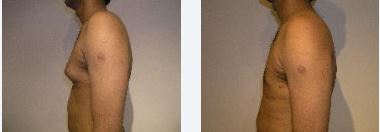(FAQs) about Gynecomastia
During gynecomastia surgery, the surgeon makes incisions on the chest to access the underlying breast tissue. Excess glandular tissue, fat, and skin are then removed, and the remaining tissue is reshaped to create a flatter and more masculine chest contour. The incisions are then closed with sutures.
Recovery from gynecomastia surgery varies depending on factors such as the extent of surgery, individual healing abilities, and adherence to post-operative instructions. Patients can expect some discomfort, swelling, and bruising following surgery and may need to take time off from work and avoid strenuous activities for several weeks.
Like any surgical procedure, gynecomastia surgery carries risks and potential complications, including infection, bleeding, adverse reactions to anesthesia, poor wound healing, asymmetry, changes in sensation, and scarring. It’s important for patients to discuss these risks with their surgeon and ensure they are well-informed before proceeding with surgery.
Gynecomastia surgery, or male breast reduction, is a surgical procedure aimed at reducing the size of enlarged breast tissue in males and improving the appearance of the chest. It typically involves removing excess glandular tissue, fat, and skin to create a flatter and more masculine chest contour.
The results of gynecomastia surgery are typically long-lasting, especially if patients maintain a stable weight and lead a healthy lifestyle after surgery. However, factors such as aging, weight fluctuations, and hormonal changes can affect the longevity of the results.








